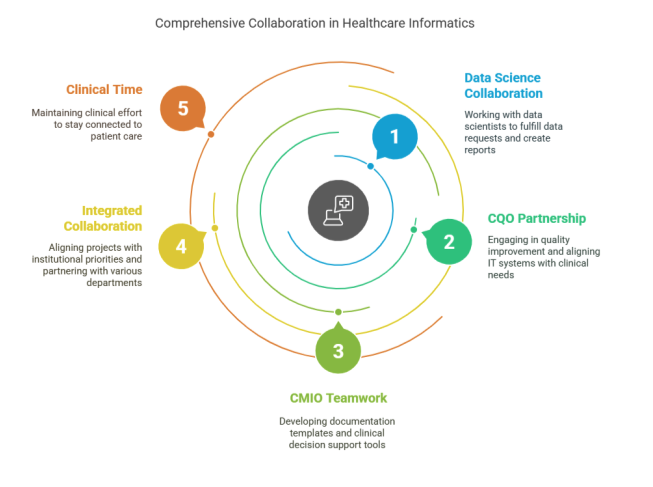Our Fellowship
Program Overview
The University of New Mexico Clinical Informatics Fellowship was founded by Dr. Phil Kroth and received ACGME accreditation in 2016. This two-year, full-time fellowship provides hands-on training for physicians interested in the intersection of healthcare, technology, and data. Fellows complete projects in a wide range of areas focused on Quality Improvement, Data Analytics, and System Implementation. The program offers unique opportunities to lead and collaborate on initiatives alongside leaders from the UNM Health Sciences Center, the VA Healthcare System, the School of Medicine, and departments such as Nursing, Pharmacy, and Quality Improvement. Fellows also have the chance to work with other informatics trainees from Nursing and Pharmacy Clinical Informatics programs at UNM.
Core Curriculum & Key Components
- Leadership & Project Management: Fellows take on real leadership roles, including committee participation and chair opportunities, gaining essential experience in managing teams and driving innovation within complex healthcare systems.
- Electronic Health Record (EHR) Implementation: Direct involvement in EHR optimization projects, working closely with the CMIO, Associate CMIOs, and enterprise IT teams.
- Information Retrieval & Analysis: Access to all clinical databases and analytics platforms to support data-driven quality improvement and research.
Fellows participate in the nationally recognized Health and Clinical Informatics online graduate certificate program from Oregon Health & Science University (OHSU), fostering collaboration with informatics fellows nationwide. They also attend the UNM Biomedical Informatics Lecture Series, a weekly academic forum featuring informatics leaders and innovators.
Collaboration with Data Science
Fellows work closely with data scientists to:
- Fulfill department and quality improvement (QI) data requests.
- Create custom reports for clinical or operational insights.
- Mine and analyze clinical data for trends and actionable information.
- Build user-friendly data interfaces for frontline clinicians.
Working with the Chief Quality Officer (CQO)
Partnering with UNM’s CQO, fellows engage in:
- Quality improvement and process redesign projects
- Aligning IT systems flows with real-world clinical needs
- Aligning IT systems flows with real-world clinical needs
Collaboration with the UNMH CMIO Team
Fellows join forces with the Chief Medical Information Officer’s office to:
- Develop and refine documentation templates
- Build and optimize order sets.
- Create MPages (custom views in the EHR).
- Design and implement Clinical Decision Support tools
Integrated Collaboration Across the Health System
All projects are strategically aligned with UNM’s institutional priorities and are developed in partnership with:
- HSC and Veterans Affairs leadership
- School of Medicine (e.g., Quality Practicum)
- UNM departments, quality teams, and informatics units
- Nursing and pharmacy programs
Clinical Time
Fellows maintain 20% clinical effort in their home specialty, helping them stay connected to patient care and identify meaningful informatics solutions.

Real-World Experience
UNM fellows are embedded within the Clinical Informatics team, with full access to meetings, decision-making forums, and project infrastructure. The program is designed to simulate the day-to-day responsibilities of a CMIO, equipping graduates with the skills and experience to step into informatics leadership roles. Fellows also maintain 20% clinical effort in their home specialty, keeping them connected to frontline care and helping identify meaningful, impactful projects. This dual perspective enhances credibility and effectiveness in leading change initiatives.
Clinical Informatics Fellowship Projects at UNM
Our Clinical Informatics Fellows at the University of New Mexico (UNM) are at the heart of data-driven transformation in healthcare. The fellowship offers hands-on experience in diverse, high-impact projects designed to improve care quality, system efficiency, and clinical decision-making.
